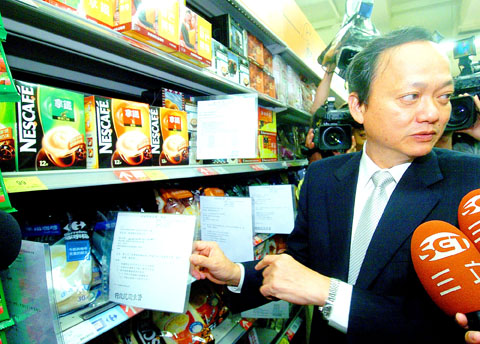By Shelley Huang Staff Reporter, with CNA
Department of Health Minister Yeh Ching-chuan (葉金川) told reporters yesterday that “no melamine detected” does not mean a product contains zero parts per million (ppm) of melamine, but rather that no melamine could be detected with the testing method used and that the product is “fit for consumption.”
In response to the recent controversy over whether the government had eased its standards on the permissible concentration of melamine from zero ppm to 2.5ppm, Yeh said a Cabinet-level inter-agency panel would discuss the definition of “standard” levels of melamine on Tuesday and seek to standardize testing procedures nationwide despite the fact that different testing instruments are available in different regions.

PHOTO: LU CHUN-WEI, TAIPEI TIMES
CERTIFIED LABS
The Department of Health (DOH) said the nation’s five laboratories certified for testing, including the Food Industry Research and Development Institute, had been working night and day to cope with the growing backlog of companies that need to have products tested.
The DOH said it planned to have another 16 labs certified by the Taiwan Accreditation Foundation to help with melamine testing.
The labs, when ready, will accept samples seven days a week, it said.
Yeh said yesterday that the DOH would meet local health authorities in 25 counties and cities tomorrow to coordinate inspection procedures.
On Tuesday, the DOH will contact experts in the US, Japan, Australia, New Zealand and the EU to collaborate on standard inspection procedures and setting a threshold for melamine detection, he said.
‘STRICTEST STANDARDS’
Yeh said the government was responsible for screening all imported foodstuffs and that all agencies, including the Bureau of Standards, Metrology and Inspection, the Bureau of Animal and Plant Health Inspection and Quarantine and the Bureau of Food and Drug Analysis would “apply the strictest screening standards.”
In response to a report in the Chinese-language Liberty Times (the Taipei Times’ sister newspaper) that customs personnel had not yet received lists of banned imports, Yeh said the task force had confirmed that instructions on banned products — including Chinese-made milk powder, other dairy products and vegetable-based proteins — had been issued as early as Tuesday.
Not one banned product has made it past Taiwan’s borders since, he said.
RANDOM CHECKS
Meanwhile the DOH said yesterday that it would step up its random examination of food products from countries with dubious food safety standards.
“We have targeted products from certain countries with questionable standards and we do not rule out the possibility of carrying out the strictest batch-by-batch examinations of suspect products,” Yeh said, declining to name any countries.
Asked to comment on the scandal involving Pizza Hut, Yeh said it was only one case and that the source of the tainted ingredients had yet to be identified.
Pizza Hut on Friday reported to the DOH that 65,000 packets of cheese powder contaminated with up to 76.2ppm of melamine may have been consumed by its customers.
Pizza Hut has since recalled all unused cheese packets.
To date, five cases of kidney stones have been reported nationwide that could be linked to melamine.

Taiwanese can file complaints with the Tourism Administration to report travel agencies if their activities caused termination of a person’s citizenship, Mainland Affairs Council Minister Chiu Chui-cheng (邱垂正) said yesterday, after a podcaster highlighted a case in which a person’s citizenship was canceled for receiving a single-use Chinese passport to enter Russia. The council is aware of incidents in which people who signed up through Chinese travel agencies for tours of Russia were told they could obtain Russian visas and fast-track border clearance, Chiu told reporters on the sidelines of an event in Taipei. However, the travel agencies actually applied

Japanese footwear brand Onitsuka Tiger today issued a public apology and said it has suspended an employee amid allegations that the staff member discriminated against a Vietnamese customer at its Taipei 101 store. Posting on the social media platform Threads yesterday, a user said that an employee at the store said that “those shoes are very expensive” when her friend, who is a migrant worker from Vietnam, asked for assistance. The employee then ignored her until she asked again, to which she replied: "We don't have a size 37." The post had amassed nearly 26,000 likes and 916 comments as of this

New measures aimed at making Taiwan more attractive to foreign professionals came into effect this month, the National Development Council said yesterday. Among the changes, international students at Taiwanese universities would be able to work in Taiwan without a work permit in the two years after they graduate, explainer materials provided by the council said. In addition, foreign nationals who graduated from one of the world’s top 200 universities within the past five years can also apply for a two-year open work permit. Previously, those graduates would have needed to apply for a work permit using point-based criteria or have a Taiwanese company

The Shilin District Prosecutors’ Office yesterday indicted two Taiwanese and issued a wanted notice for Pete Liu (劉作虎), founder of Shenzhen-based smartphone manufacturer OnePlus Technology Co (萬普拉斯科技), for allegedly contravening the Act Governing Relations Between the People of the Taiwan Area and the Mainland Area (臺灣地區與大陸地區人民關係條例) by poaching 70 engineers in Taiwan. Liu allegedly traveled to Taiwan at the end of 2014 and met with a Taiwanese man surnamed Lin (林) to discuss establishing a mobile software research and development (R&D) team in Taiwan, prosecutors said. Without approval from the government, Lin, following Liu’s instructions, recruited more than 70 software